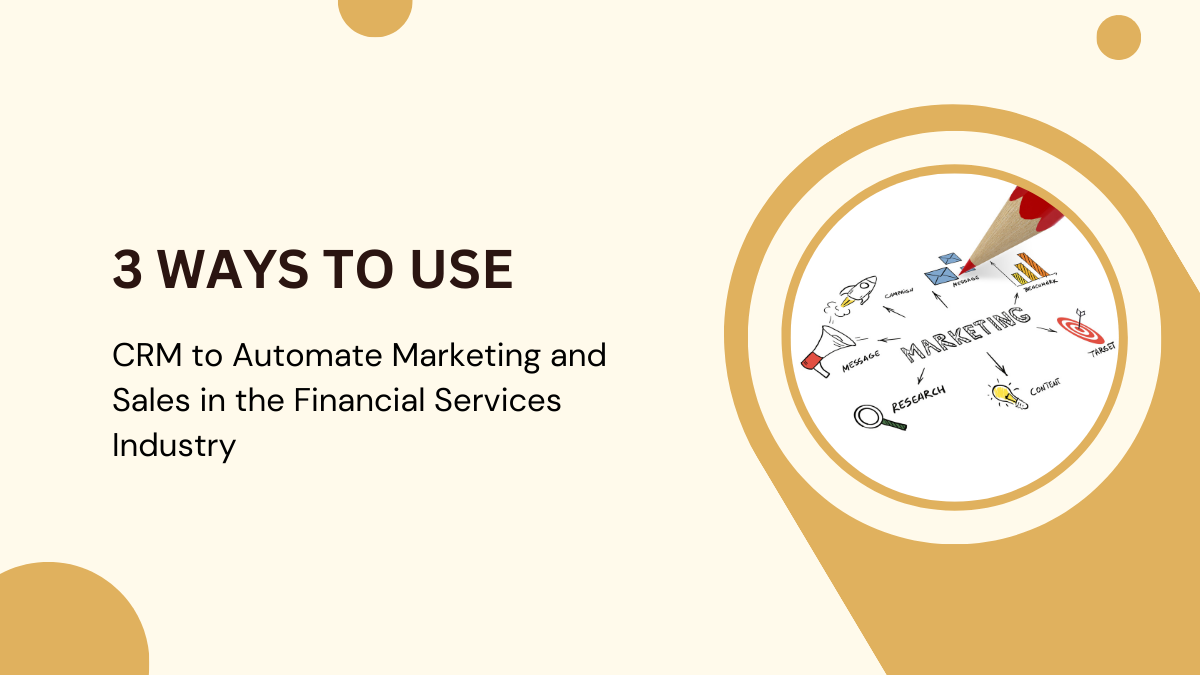Are you tired of spending countless hours manually managing your marketing and sales efforts in the financial services industry? Look no further! In today’s digital age, Customer Relationship Management (CRM) systems have become a game-changer for businesses looking to automate their processes.
With the right CRM tool, you can streamline your marketing campaigns, boost sales productivity, and achieve unprecedented growth. In this blog post, we will explore three powerful ways to leverage CRM technology to automate marketing and sales in the financial services industry.
Get ready to transform your business operations and maximize efficiency like never before!
The importance of automation in marketing and sales
In recent years, automation has become an essential tool for businesses in all industries, and the financial services sector is no exception. Financial services companies must adopt automation strategies to stay ahead of increasing competition and rapidly changing market trends.
- Streamlining Processes and Increasing Efficiency
One of the main reasons automation is crucial for marketing and sales in financial services companies is its ability to streamline processes and increase efficiency.
By automating repetitive tasks such as data entry, lead nurturing, email campaigns, and social media management, employees can focus on critical tasks such as building client relationships and providing personalized solutions. This saves time and leads to a more efficient workflow within the organization.
- Personalization at Scale
Marketing and sales efforts in the financial services industry heavily rely on personalization to attract potential customers and retain existing ones. However, manually personalizing each communication can be time-consuming and often leads to inconsistencies.
With CRM automation tools, companies can segment their target audience based on various criteria such as demographics, behaviour patterns, interests, etc., and create tailored content that resonates with each group. This not only improves customer engagement but also increases conversion rates.
- Better Lead Management
For any business, managing leads effectively is critical for generating revenue. In the financial services industry, lead management becomes even more crucial with long buying cycles and multiple decision-makers involved in a purchase decision. Automation allows companies to track leads from different channels.
How CRM can help automate lead generation and nurturing processes
Customer Relationship Management (CRM) systems are powerful tools for automating various aspects of marketing and sales processes in the financial services industry.

- Use of personalized email campaigns and tracking customer interactions
Building strong relationships with customers is crucial for success in the financial services industry. This is where Customer Relationship Management (CRM) systems come into play – allowing financial institutions to manage and track customer interactions effectively.
One powerful feature of CRM that can significantly benefit financial institutions’ marketing and sales efforts is personalized email campaigns and tracking customer interactions.
- Utilizing data analytics to identify potential customers and cross-selling opportunities
In today’s highly competitive financial services industry, companies must constantly seek out new customers and opportunities for cross-selling.
With the abundance of data available in this digital age, utilizing data analytics has become integral to identifying potential customers and cross-selling opportunities.
Data analytics involves using various techniques and tools to analyze large data sets to uncover patterns, trends, and insights that inform business decisions.
By leveraging data analytics within your CRM system, financial service companies can better understand their target market, customer behaviour, and preferences. This allows them to tailor their marketing and sales strategies to reach potential customers and increase cross-selling success effectively.
- Creating automated workflows for follow-up tasks and reminders
In today’s fast-paced business world, time is of the essence, and efficiency is critical. This is especially true in the financial services industry, where keeping track of client interactions and follow-up tasks can be overwhelming.
However, with the help of Customer Relationship Management (CRM) software, financial service companies can automate their marketing and sales processes to save time and increase productivity.
One powerful feature of CRM software is its ability to create automated workflows for follow-up tasks and reminders. These workflows are computerised actions triggered by specific events or conditions the user sets.
For example, when a lead fills out a contact form on your website, you can set up an automated workflow to send them a personalized email thanking them for their inquiry and a reminder for your team to follow up with them in a week.
Ways to automate sales processes with CRM
Customer Relationship Management (CRM) software has become an essential tool for businesses in today’s digital age. It helps manage customer relationships and plays a crucial role in automating various sales processes. This automation not only saves time and effort but also leads to increased efficiency and productivity.
Lead scoring to prioritize high-value leads.
Lead scoring is a crucial aspect of the sales and marketing process in the financial services industry. It refers to assigning a numerical value to leads based on their likelihood to convert into customers. This helps businesses prioritize their efforts towards high-value leads, leading to more efficient and effective sales and marketing strategies.
Lead scoring involves evaluating factors such as demographics, behaviour, engagement level, and other relevant data points related to the lead. Each element is assigned a specific weightage based on its importance in predicting conversion. For example, factors like income level or job title might be given more weight than age or location.


0 Comments